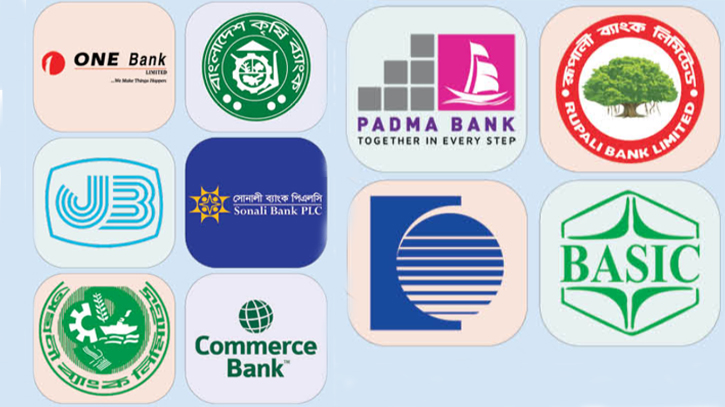
Photo: Messenger
A total of 14 banks identified as weak have shown no improvement even after one year of getting observers and coordinators. In light of the overall situation of both state-owned and private sector banks, the central bank appointed observers and coordinators after declaring them weak. According to the information obtained from Bangladesh Bank (BB), there has been no change in the condition of these banks.
Sources in the BB revealed that 10 banks were identified as weak in 2022 due to issues such as high non-performing loans, capital crunch, provisioning shortfall, and breach of credit disbursement limits. In January 2023, four more banks were added to this list due to various loan scams. BB appointed observers and coordinators in a total of 14 public and private banks to monitor loan irregularities.
Simultaneously, during subsequent board meetings of these banks, the central bank directed them to focus on their cash flow and liquidity situations. The central bank also requested updates on any approved loans. Despite these measures to improve the financial situation of the banks, almost all have deteriorated except for one or two, as per the information obtained from BB.
Currently, there are coordinators in six banks and observers in eight banks. The banks with observers include state-owned Sonali Bank, Janata Bank, Rupali Bank, Agrani Bank, specialised Bangladesh Agricultural Bank, and private Islami Bank, ICB Islami Bank, and First Security Islami Bank. The banks with coordinators are AB Bank, One Bank, National Bank, Padma Bank, BASIC Bank, and Bangladesh Commerce Bank. Additionally, special scrutiny has been applied to the foreign National Bank of Pakistan due to significant irregularities in its credit system.
According to BB statistics, the foreign National Bank of Pakistan was in the worst condition in December 2022. The bank’s 97.92 percent of the total loans disbursed were in default, amounting to Tk 1354 crores. By September, defaulted loans increased to Tk 1355 crore or 98.18 percent, with a capital deficit of Tk 43.45 crore.
In December 2022, Padma Bank’s defaulted loans were Tk 3423 crore, which is 59.27 percent of disbursed loans, with a capital deficit of Tk 425 crore. By the end of the first quarter of the current financial year, defaulted loans stood at 3673 crores or 63 percent, and the capital deficit increased to Tk 608 crore.
Among public sector banks, Janata Bank had 18.24 percent of loans disbursed defaulted, totalling Tk 14386 crores. Although there was no provision deficit, the deferral amounted to approximately Tk 8500 crore, with a capital deficit of Tk 2300 crore. The bank's defaulted loans increased to Tk 17 thousand crores, and the capital deficit rose to Tk 3030 crore.
Sonali, which is the largest state-owned bank, had a non-performing loan of 15.43 percent. The bank utilised a deferral facility of Tk 4000 crore, despite showing no provision deficit, and had a capital deficit of Tk 2273 crore. By September, defaulted loans rose to 16 percent, but Sonali Bank managed to cover the capital shortfall.
Another state-owned bank, Rupali, had defaulted loans of Tk 6630 crores or 16.56 percent, with a provision deficit of Tk 2814 crore and a capital deficit of Tk 2390 crore. Last September, defaulted loans stood at 20.70 percent or Tk 8728 crore, with a provision deficit widening to Tk 4198 crore and a slightly reduced capital deficit of Tk 2122 crore.
Agrani Bank, another state-owned bank, had defaulted loans of Tk 14810 crores, accounting for 22.31 percent of the total loans. The bank had a provision deficit of Tk 4422 crore and a capital deficit of Tk 2851 crore. By the end of the first quarter of the current financial year, defaults had increased to Tk 16874 crore, with a provision deficit of Tk 4600 crore and a capital deficit of Tk 4829 crore.
Specialised BASIC Bank is reported to be in a fragile state, and the conditions of private sector banks, including National Bank, AB Bank, One Bank, and Bangladesh Commerce Bank, are reported to have worsened.
Meanwhile, Islami Bank, the largest Islamic bank in the private sector, has improved compared to the previous situation. Despite allegations of loan irregularities, First Security Islami Bank and Islami Bank Bangladesh have a relatively good position regarding defaults, with defaulted loans standing at 4 percent or slightly more.
When asked to comment, the managing director of the bank did not respond. However, the managing director of a state-owned bank told The Daily Messenger on condition of anonymity, “In some cases, the observer is not able to play a very good role. No response is available despite seeking their opinion. Besides, it may be difficult for them to pay attention to the pressure of Bangladesh Bank.”
A private bank observer told The Daily Messenger on the condition of anonymity, “Boards of banks that have observers are very influential. There are many instances where we gave many suggestions but were not followed. The boards of these banks need to be dissolved. A bank’s board has already changed. There should be more.”
When asked about this, Bangladesh Bank Executive Director and Spokesperson Mezbaul Haque told The Daily Messenger, “It is not possible to say what the condition of the banks is now. However, not all banks have deteriorated further. It will take time to know what progress has been made, and further information will be provided after the monetary policy announcement.”
Messenger/Disha








